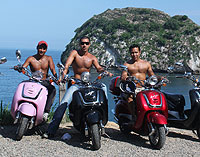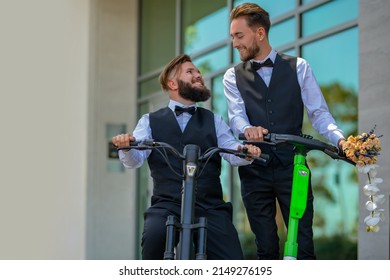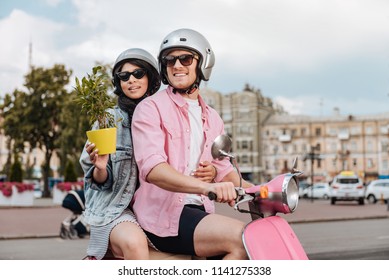The Vibrant World Of Gay Scooter Culture: Community, Style, And Freedom On Two Wheels
When you hear the word "scooter," what comes to mind? Perhaps sleek Italian Vespas, nimble urban commuters, or even the electric kick scooters zipping through city streets. But for a growing and vibrant community, the scooter represents something far more profound: a symbol of identity, camaraderie, and unapologetic self-expression. Welcome to the fascinating world of "gay scooter" culture, a dynamic movement that blends the thrill of two-wheeled travel with the inclusive spirit of the LGBTQ+ community.
This isn't just about a mode of transport; it's about a lifestyle, a community, and a statement. From organized clubs to lively social hubs and a strong presence in digital spaces, gay scooter enthusiasts are revving up hearts and challenging traditional notions of biker culture. Technically, they're not a biker club at all – they ride scooters! And in doing so, they're forging unique paths and building powerful connections.
More Than Just a Ride: The Spirit of Gay Scooter Culture
At its core, gay scooter culture is built on the foundation of community and shared passion. It offers a unique space where individuals can connect, celebrate their identities, and embark on adventures together. This sense of belonging is palpable, whether on a scenic group ride or at a lively social gathering.
A Rich Tapestry of Community and Belonging
Across the globe, dedicated groups and clubs have formed, creating safe havens for LGBTQ+ scooter enthusiasts. In Seattle, Washington, the Sqream Scooter Club stands out as a prominent example, catering specifically to gay and lesbian riders. Their existence underscores the desire for spaces where shared interests and identities can intersect freely. Similarly, the Scooter Rats Garage in Milwaukee, Wisconsin, contributes to the diverse landscape of scooter communities, even if not explicitly LGBTQ+-focused, they are part of the broader scooter world that embraces diversity.
The spirit of organized scooter culture extends far beyond individual cities. David Westman started a club in Denver, Colorado, in July 2004, which has since expanded with chapters in Buffalo, Cleveland, New England, Phoenix, San Diego, and Seattle. These chapters highlight the widespread appeal and the successful replication of this community model. In the UK, Peace and Love Scooters, established in 2021, embodies a queer-friendly, liberal ethos, firmly believing in welcoming everybody without exception. This commitment to inclusivity is a cornerstone of the gay scooter movement, fostering an environment where, as one enthusiast noted, "gay scooter kids find camaraderie and solidarity, creating a safe space where they can fully express their authentic selves without the fear of judgment."
These groups aren't just about riding; they're about building bonds. They bring people together for what many describe as "long, scenic group rides" – the kind of experiences that forge lasting friendships and create cherished memories. The Gay Biker community, open to "all generations of gay bikers riding motorcycles, enduros, scooter and pedelecs," further exemplifies this expansive and welcoming approach, uniting gay men motorbike riders and scooter enthusiasts alike.
- Corey Bonner
- Bob Hope Desert Classic 1973
- 777 Manifestation Meaning
- Alicia Lyons
- Red Fawn French Bulldogs
Style, Expression, and Identity on Two Wheels
Scooters have long been associated with distinct subcultures and personal expression. The teens who adopted the Vespa as their mode of transport used the scooter as a way to escape their working-class jobs, transforming the pressed metal, chrome-lined scooter into a symbol of rebellion and individuality. This legacy of personal style continues within the gay scooter community.
For many, the scooter is an extension of their personality. From custom paint jobs to unique accessories, every detail can reflect the rider's identity. You can even "Check out our gay scooter selection for the very best in unique or custom, handmade pieces from our cycling accessories shops," indicating a market for personalized gear. This extends to personal attire as well; as one rider humorously noted after converting from a motorcycle to a scooter, "I know a bunch of you will not like my riding jackets, that don't have armor, but that is another deal." This speaks to a preference for style and comfort over strict traditional gear, reflecting a broader sense of freedom in self-expression.
Beyond adult enthusiasts, urban mobility for children has also taken on a new and colorful dimension with the emergence of "Lehuo gay scooters." This quirky yet functional mode of transportation shows how the concept of "gay scooter" can even extend to playful, inclusive products for younger generations, adding a vibrant and modern twist to children's mobility options.
Visibility and Celebration: Gay Scooters in the Spotlight
The gay scooter phenomenon isn't confined to local clubs; it's increasingly visible in media, online spaces, and social venues, amplifying its message of acceptance and celebration.
Media and Online Presence
The digital age has provided a powerful platform for the gay scooter community to connect and showcase their vibrant culture. Short films and online videos offer glimpses into their world; for instance, "Here's a 2-minute movie about a gay scooter gang that'll rev up your heart." Such content helps to break down stereotypes and introduce a wider audience to the unique dynamics of these groups.
Social media platforms like TikTok are buzzing with activity, with hashtags like #gayscooter garnering "49.1K views" and #gayscooterrider also featuring prominently. These platforms allow riders to share their experiences, showcase their scooters, and connect with a global audience, fostering a sense of shared identity and visibility. Online forums and communities, such as r/Rainbowrider on Reddit, further reinforce this digital presence, providing "an actively moderated safe space for folks who identify anywhere within the queer sexuality spectrum, and/or the queer" community, including scooter enthusiasts.
Beyond the Road: Social Hubs and Advocacy
The culture extends beyond the open road into dedicated social spaces. Scooter's Bar in Eau Claire, Wisconsin, is a locally owned and operated gay bar that serves as a community hub, offering a place for connection and celebration. Similarly, "Scooter's" is recognized as "Among the Valley's best spots for LGBTQ nightlife and one of the best dance clubs around," complete with "drink specials every day, as well as pool, darts, touch-screen games, free" entertainment. These venues provide crucial spaces for the LGBTQ+ community to gather, socialize, and express themselves freely, often becoming informal meeting points for scooter enthusiasts.
The visibility of gay scooter culture also extends into mainstream advertising and advocacy. One notable example is an ad that "promotes its services with a gay pride commercial featuring the theme, 'Get Who Gets You – Scooter.'" This commercial "attempts to normalize and glorify the LGBTQ" community, using the scooter as a symbol of connection and understanding. Such initiatives play a vital role in increasing acceptance and representation for the LGBTQ+ community at large.
The Evolving Landscape of Scooter Enthusiasts
The appeal of scooters is broad and ever-expanding, attracting a diverse range of riders, including those who are new to two-wheeled transport or transitioning from other forms of riding.
From Motorcycles to Scooters: A Shifting Preference
The versatility and accessibility of scooters are drawing in new converts. As one rider shared, "OK, I am a recent convert from motorcycle to scooter." This transition highlights the practical benefits and growing appeal of scooters for various reasons, whether for urban commuting, ease of handling, or simply a different riding experience. The sentiment that scooters "show the best of what scooters can do for everyone" underscores their universal appeal, regardless of background or prior riding experience. They offer a unique blend of freedom and practicality that resonates with many.
Even when grounded without a primary bike, the passion for scooters shines through, as exemplified by one individual who "put together a little scooter edit" when they "don't have my bike." This demonstrates the deep personal connection and enthusiasm many feel for scooters, making them a go-to choice for personal mobility and enjoyment.
Inclusivity at Its Core
The gay scooter movement is a powerful testament to inclusivity. It actively fosters environments where everyone is welcome, regardless of their background, experience, or identity. The "Peace and Love Scooters" group's firm belief in "welcoming everybody to the UK without exception" encapsulates this core value. This commitment to open arms ensures that new members, whether seasoned riders or curious newcomers, feel comfortable and accepted.
The broad definition of membership in groups like "Gay Biker," which is open to "all generations of gay bikers riding motorcycles, enduros, scooter and pedelecs," illustrates the expansive nature of this community. It’s a space where different types of two-wheeled vehicles are embraced, and the focus remains on shared identity and camaraderie. This inclusive approach strengthens the community, making it a vibrant and diverse tapestry of individuals united by their love for scooters and their shared LGBTQ+ identity.
Conclusion
The "gay scooter" phenomenon is far more than a niche interest; it's a thriving cultural movement that embodies community, self-expression, and freedom. From the organized clubs that provide safe spaces for camaraderie and long, scenic rides, to the vibrant social hubs and increasing visibility in media, gay scooter culture is making its mark. It celebrates individuality through unique styles and accessories, while also embracing a broad spectrum of riders, including those transitioning from motorcycles or simply seeking a fun, accessible mode of transport. This movement powerfully demonstrates how a shared passion for scooters can unite individuals, normalize LGBTQ+ identities, and create a truly inclusive and joyful world on two wheels.
Final Summary
Gay scooter culture represents a vibrant intersection of scooter enthusiasm and LGBTQ+ identity, fostering strong communities, unique styles, and increased visibility. Through dedicated clubs, social venues, and digital platforms, it provides safe spaces for self-expression and camaraderie, demonstrating how scooters bring people together and celebrate diversity.
- Klaffs Lighting
- Does Corner Bakery Serve Breakfast All Day
- Amy Henson
- Virginia Gold Cup Photos
- Alicia Lyons

Gay Scooter Tour of Puerto Vallarta

62 Gay couple on scooter Images, Stock Photos & Vectors | Shutterstock

62 Gay couple on scooter Images, Stock Photos & Vectors | Shutterstock